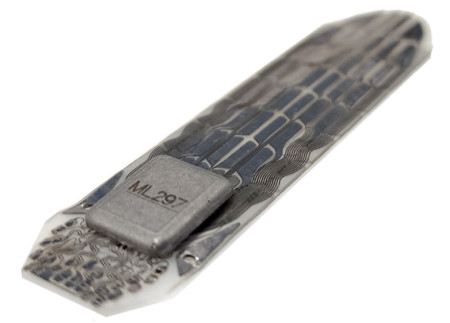First Computer Chip in Spine Offers Hope, Opens Door for Injectable Therapies in Chronic Pain, Sleep Apnea, and Migraines

SOMERVILLE, Mass., October 1, 2024 (Newswire.com) - Micro-Leads Inc. today announced the results of a first-in-human pilot study using a high-resolution computer chip tested in peoples’ spine. The study's findings arrive as companies like Synchron, Neuralink, Paradromics, and Onward are researching brain implants to restore function after paralysis. Micro-Leads developed the world’s first spine-chip to both read and write spinal cord signals using a minimally-invasive procedure.
For decades, spinal cord interfaces have been limited by uncomfortable side effects and limited restoration of movement. The study published in Neurosurgery showcases a two-times greater resolution in targeting the spinal cord fibers using the spine-chip called HD64™ developed by Micro-Leads. With its enhanced resolution, HD64™ not only covers a broader neural area but also provides a scalable approach to targeting multiple neurological regions and unlocks new therapeutic opportunities for Brain-Computer Interfaces (BCI) and spinal cord stimulators (SCS).
The latest clinical study in 20 participants was published by Dr. Julie Pilitsis, M.D., neurosurgeon and chair of the Department of Neurosurgery at the University of Arizona College of Medicine in collaboration with Micro-Leads. Dr. Pilitsis remarked, “This high-resolution study represents a significant advancement in precision spinal cord interfaces, paving the way for more personalized treatments for patients suffering from chronic pain and other disorders.”
Doug Weber, Ph.D. a Brain Computer Interface expert and Professor of Neuroscience at Carnegie Mellon University, stated: "Many existing BCIs face challenges with precision and scalability, making it difficult to accurately record and stimulate multiple regions of the spinal cord and brain. The HD64 spine-chip provides an unprecedented capability for sensing and modulating neural activity not only in the spinal cord, but the brain and peripheral nerves as well.”
Bryan McLaughlin, Ph.D. and CEO of Micro-Leads, said, “The success of this clinical study confirmed the benefit of precision nerve targeting. We’re seeing a brand-new class of needle-injectable therapies emerge from this clinical study.”
About Micro-Leads Inc.
Micro-Leads is a medical device company committed to improving patients’ health using precision neuromodulation therapy. Micro-Leads developed the HD64 spine-chip initially for high-resolution spine and BCI therapies. Micro-Leads is developing a family of minimally-invasive injectable electrodes, alongside a bluetooth pulse generator, charger, tablet, and ASICs. The study was funded by the NIH’s National Institute of Neurological Disorders and Stroke. For more information: www.micro-leads.com
About the University of Arizona College of Medicine – Tucson
The University of Arizona College of Medicine is shaping the future through state-of-the-art medical education programs, groundbreaking research and advancements in patient care. The college boasts 55 years of innovation and academic medicine leadership through the university’s partnership with Banner Health. Visit: medicine.arizona.edu
*HD64 was tested under an investigational device exemption (IDE) by the FDA.
Source: Micro-Leads Inc.
